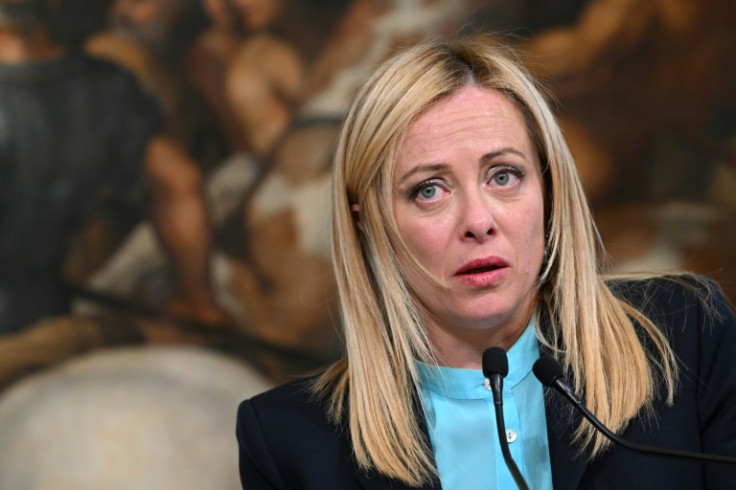Tough At Home, Steady Abroad: Six Months Of Italy's Meloni

Six months after taking the helm of Italy's most right-wing government since World War II, Giorgia Meloni has talked tough on domestic issues but not rocked the boat internationally.
Meloni's Brothers of Italy party, which has roots in the post-war Fascist movement, sent shock waves across the European Union when it came top in September elections.
She took office in October at the head of a coalition comprising Matteo Salvini's anti-immigration League and Silvio Berlusconi's right-wing Forza Italia.
Within weeks, they introduced laws to tackle mass migration and, after vowing to protect traditional family values, stopped local authorities registering the children of same-sex couples.
But Meloni is aware of the need for economic credibility, and despite handing out billions of euros to help Italians manage soaring inflation, and moves to cut taxes, she has committed to reducing Italy's colossal debt and the deficit.
The self-described "Christian mother" has also toned down her once-inflammatory rhetoric and sought to project stability on the world stage, including strongly supporting Ukraine following Russia's invasion.
Commentators say that while she portrayed herself as a radical to win power, she needs to widen her appeal if she wants to stay there.
"She's moved to the centre very, very quickly... to look beyond the radical right electorate," said Daniele Albertazzi, professor of politics at the UK's University of Surrey.
For more moderate Italians, "she's saying, I'm not a monster. I haven't done anything to rock the boat."
Meloni's election victory was attributed in part to her appeal as a fresh face, as leader of the only party that stayed out of Mario Draghi's national unity government.
So far, her support is holding up -- the latest YouTrend survey showed Brothers of Italy with 28.6 percent of voter support, above the 26 percent it won in September.
On the domestic front, the coalition acted quickly to demonstrate it would keep its manifesto promises, helped by a weak opposition.
The first migration decree limited the activities of charities operating rescue ships in the Mediterranean, while Meloni later moved to eliminate a special protection status for migrants who do not qualify as refugees.
Critics warned the moves would cost lives and remove basic rights from vulnerable people.
Meanwhile, about 35,000 people have landed on Italy's shores so far this year, four times as many in the same period in 2022 and 2021.
Agriculture Minister Francesco Lollobrigida, a close aide, also drew outrage this week by warning against the "ethnic replacement" by migrants of Italians, who have for decades recorded a low birth rate.
Meloni has vowed to provide more help for families, while railing against what she has called "the LGBT lobby".
Earlier this year, the coalition blocked local authorities that had been registering the children of same-sex couples in the absence of a national legal framework.
The move left thousands of families in limbo and was condemned by European MPs who expressed fear of a broader attack against Italy's LGBTQ community.
Francesco Galietti, from the Policy Sonar consultancy, says many domestic measures -- which include a widely mocked proposal to ban non-Italian words in public communications -- are about keeping Meloni's allies onside.
Most of the government's domestic policies "arise from coalition infighting", he told AFP.
Commentators are closely watching Salvini, who has been forced to play second fiddle to Meloni after she won over many of his voters.
For now, as deputy prime minister and infrastructure minister, he spends much of his time criss-crossing Italy in a hard hat and high-visibility jacket, on visits widely publicised on his social media channels.
Meloni meanwhile is prime-ministerial, visiting and receiving global leaders and avoiding any major gaffes.
"She strikes me as by far the most professional political operator we have now at the moment," Galietti said.
Brothers of Italy once advocated leaving the eurozone, but Meloni has been careful to avoid ruptures with the EU, despite an early spat with France over who should take in a migrant boat.
"She has positioned herself in quite a moderate way in the international arena, especially by pledging very vocally her Atlanticism and support for Ukraine," said Marianna Griffini, lecturer in European and International Studies at King's College London.
"Regarding the EU, it's important that Meloni just keeps quiet and compliant."
Italy is set to receive almost 200 billion euros ($219 billion) from the EU's post-pandemic recovery fund by 2026, in return for structural reforms.
The latest payment due in March was delayed pending further discussion with Brussels, but Meloni insists there is no cause for concern.
© Copyright AFP 2024. All rights reserved.





















